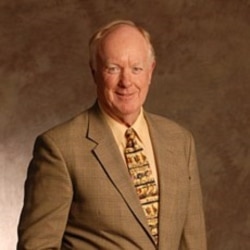Click Arrow to Hear This Program:
Or download MP3 (Right-click or option-click and save link)
AA: I'm Avi Arditti with Rosanne Skirble, and this week on WORDMASTER: More about a legal strategy that critics call by the acronym SLAPP -- a strategic lawsuit against public participation.
Let's say some community activists are trying to persuade the local government to reject a development project. The developer might sue them for defamation and seek millions of dollars in damages. The developer might have little chance of winning, but the activists still have to defend themselves against the lawsuit. The use of SLAPPs began to grow in the nineteen seventies as Americans became more active in government.
GEORGE PRING: "SLAPPers are not all bad people and SLAPPees, or SLAPP victims, they're not all good people either. But what we're saying is, there's always a better place to solve a public governmental issue, better than the courts."
Law professor George Pring wrote a book with sociologist Penelope Canan called "SLAPPs: Getting Sued for Speaking Out." Since it was published in 1996, he says, more than half the states have adopted anti-SLAPP laws similar to the model they proposed. But now there's a new breed of SLAPP.
GEORGE PRING: "Just the way SLAPPs against government communication exploded in the nineteen seventies, we're seeing an explosion now in the twenty-first century of lawsuits, generally by economic interests, against the bloggers, the Facebookers, the tweeters, people who text. Even texting can get you in trouble.
"Interestingly enough, big companies, you're always thinking about this Goliath vs. David. It's usually not. It's usually Davids vs. Davids. Big companies -- you know, BP, British Petroleum, whatever -- have many, many other ways to counteract public criticism. Of course, BP isn't doing such a good job right now."
AA: "And how are courts coming down on this, how are they ruling in cases like David vs. David, meaning smaller company vs. a private citizen type case?"
GEORGE PRING: "That's the problem, in the states that either have only a protection for communications to government or no protections at all."
RS: "And what model would you put here to resolve these cases? You suggested a model that you wrote about in your book, but what model for the new media would you suggest?"
GEORGE PRING: "The California model, or even better the new bill that is in the United States Congress right now, the anti-SLAPP bill. It would protect and dismiss quickly a lawsuit attacking communications with government or a lawsuit attacking communications to the public on an issue of interest to the public."
RS: "And finally I'd just like to ask one last question about how the lawsuits and the freedom of speech and the trials that you're talking about, not only the trials in court but the trials of living through such a situation, how does this characterize who we are as Americans?"
GEORGE PRING: "From a constitutional law standpoint, a human rights standpoint, America protects free speech at an extreme unmatched by any other government, which is both good news and bad news. It depends on which side of the issue you're on. In our country, typically, cases brought in defamation, libel, slander, are very hard for the filer of the lawsuit -- the SLAPPer -- to prove. In other countries like England, the roles are entirely reversed and it's the speaker who is in big trouble in the lawsuit and basically has to prove total innocence and total truth.
"So what it tells us about America is generally speaking we view speech, expression, as a free market in ideas. And people are going to put things into the market that aren't true, that aren't valuable, that aren't worthwhile. But we don't want the government, we particularly don't want the courts to act as censors. And what these cases are is nothing more or less than asking the courts to censor public discourse on public issues."
AA: George Pring is a law professor at the University of Denver in Colorado. You can find the first part of our interview at voanews.com/wordmaster. And that's WORDMASTER for this week. With Rosanne Skirble, I'm Avi Arditti.



